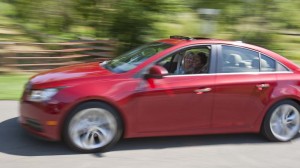General Motors appears to be reversing its long-standing resistance to the use of diesel power for its passenger car line-up – and may soon introduce an “oil burner” into its Chevrolet Cruze line-up, which would give the compact model hybrid-level fuel efficiency that could approach 50 mpg.
Like many manufacturers, GM has been wary of diesels despite their chart-topping mileage. The key issue has been the cost of meeting ever-toughening emissions standards. But the industry giant has also been concerned whether U.S. motorists would be turned off by diesel’s other disadvantages.
The change in mindset might reflect the continuing growth in demand for diesel-powered offerings now provided by most of the German makers, some Volkswagen, Audi, BMW and Mercedes-Benz models seeing diesel options climbing to nearly a third of their powertrain mix.
While several GM officials declined to comment on the record, they privately confirmed that the high-mileage technology is starting to win converts among senior management, especially with the Obama Administration pushing for fuel economy standards to jump from 37.5 mpg in 2016 to as much as 56.2 mpg in 2025.
Most experts believe that some form of hybrid or pure battery power would be needed to get there, though diesels could change the equation. Indeed, in Europe, where diesels already account for about half the new vehicle market, manufacturers like Peugeot and Volvo are working up plug-in diesel hybrids that could yield fuel economy numbers in the 80s and even 90 mpg range.
A report in the Associated Press suggests a diesel version of the Chevy Cruze could reach U.S. showrooms by 2013 or shortly after. Though GM would likely tap into some of the technology it already has for its European operations it would still need to homologate any diesel powertrain to meet tougher U.S. standards regulating cancer-causing particulates and smog-causing oxides of nitrogen.
How much that will cost is a critical question. Many industry officials estimate the typical Euro-diesel conversion at as much as $5,000 – perhaps more as U.S. standards tighten. That would a significant penalty considering the current base version of the Cruze is just $16,525. It’s a lot easier to justify a diesel in a more costly, full-size pickup truck, one source emphasized, especially considering the massive savings on fuel are amplified by the extra torque and towing power truck diesels are known for.
But advanced fuel injection technologies, improvements in turbocharging and other systems also shared with gasoline engines could help bring the price tag down to the point where a passenger car diesel would be economically viable. The key is that the cost likely would be no more than what it would take to develop a hybrid Cruze getting similar mileage.
Recent studies have shown that fuel economy has become the single overarching concern for American motorists – though, curiously, demand for hybrids has not kept pace despite rising fuel prices. The real surge in demand has been for more conventional models that have adopted more advanced, high-efficiency powertrains.
GM knows it has to keep pace in a mainstream segment like the one Cruze currently dominates. With major Japanese makers like Honda and Toyota still struggling with shortages resulting from Japan’s March 11 disaster, Cruze has become America’s best-selling passenger car.
GM isn’t the only domestic maker reconsidering diesel options. Both Chrysler and Ford are looking at various opportunities. Like GM, they have plenty of access to European technologies, Chrysler likely to turn to its new, Italian partner, Fiat. Several Japanese makers, including Honda and Mazda, could wind up with diesels in their U.S. line-ups, as well.
But cost isn’t the only concern. Many Americans still remember the noisy, slow, rough-running and smelly diesels of decades past. The good news is that the latest models don’t smoke, are smooth, efficient and often out-perform comparable gasoline models – a message Audi has tried to drive home by campaigning diesels like the new R18, which just won the grueling 24 Hours of Le Mans.


The “oil burner” Volvo C30 1.6 D DRIVe Start/Stop of 2010,
with 1350 Kg (3000lb) curb-weigh,
and with 109 PS/4,000 rpm,
is officially classified/measured at 62.5 miles per gallon (combined cycle),
while the same car makes no more than 35 miles/gallon with the gasoline engines.
VOLVO knows that the leaner the Diesel goes, the better for the efficiency, economy, pollution.
Bill Gates, Khosla, OPOC, Navistar, Generac etc know the same thing and furthermore that in order to be able to make it run even leaner, one needs to reduce the friction losses and the pumping losses, i.e. to make a simpler arrangement of fewer parts.
That’s why they pursue their OPOC “oil burner” claiming “50% fewer parts than a conventional engine”.
On the other hand:
The vibration-free PatOP engine at http://www.pattakon.com/pattakonPatOP.htm needs 50% fewer parts than the OPOC of EcoMotors.
Thanks
Manousos Pattakos